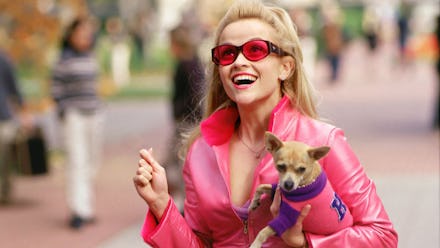In Praise of Elle Woods, Feminist Film Icon, 15 Years After 'Legally Blonde'

It takes about two seconds after stepping onto the campus of Harvard Law School for everyone to discredit Elle Woods (Reese Witherspoon). Dressed in hot pink from head to toe, with a moving van full of stuff behind her and a water bowl for her tiny dog Bruiser, she's set up as a walking joke.
Yet slowly over the course of Legally Blonde, Elle gains respect. She wins over her toughest critics, from her professors to her romantic rival Vivian (Selma Blair). She does it all without changing who she is — her final success in court is while clad in all pink, spouting facts about perm maintenance.
Since Legally Blonde's release, both the film and Elle have been hailed as feminist — which makes sense. She's a strong female character making her way through a man's world.
Still, when the film came out 15 years ago, it was hard to think of Elle as a feminist. She herself might not have self-identified as such — despite her intelligence and savvy, she wasn't very political. She'd likely leave the protests to her colleague Enid.
Yet Elle represents a powerful kind of personal feminism. Instead of representing a generic version — one that calls to mind stereotypes of bra-burning and Gloria Steinem — Elle's feminism is purely her own. Think of Beyoncé, who put forth her own definition of the term by co-signing Chimamanda Ngozi Adichie's description in her song "Flawless." Hers, and Elle's, is not a rejection of the historical idea of feminism; rather, it's their own personal adaptation.
What makes Elle's personal feminism so powerful is that she doesn't change herself to fit any kind of idea. She puts her nose to the grindstone and becomes the best law student she can be, but she never gives up fashion or personal interests. She's proudly herself while dominating in her field. That's incredibly inspiring, and remarkably complex for what is so often dismissed as a "chick flick."
Even in the 2007 musical adaptation, Elle (Laura Bell Bundy in the original Broadway cast) follows a similar trajectory. After almost quitting law school, she's inspired by Vivian (Kate Shindle) to "get back in the game," even providing her a somber dark suit for court. Elle rejects it, instead coming out in a pink suit instead. It's a small but powerful declaration: Elle is going to win, and she's going to do it on her terms.
Elle deserves her place in the line of feminist icons, pink suit and all. She's not a stereotype, not what one commonly thinks of as a feminist character. But that's what makes her all the more effective: She'll surprise all the boys. And while they're still dazed by the pink and blonde, she's busy running in circles around them.
Read more